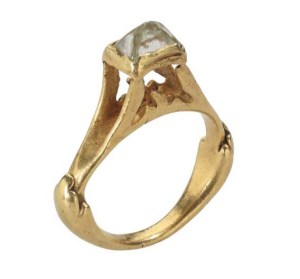Throughout history and across the world, rings have held a special value – often symbolic and sentimental as well as monetary. A new exhibition at Les Enluminures makes this beautifully clear: until 6 December, a selection of rings from the Benjamin Zucker Family Collection will be on display – and for sale – in their New York space. ‘Cycles of Life’ brings together exceptional examples from the third century AD to the late 19th century, and groups them according to broad themes such a marriage, death, and eternity. We spoke to Sandra Hindman to find out more.
Tell us about this collection – what makes it so special?
Firstly just the quality of the stones and the workmanship. Benjamin Zucker is a precious stone dealer himself, so he collected with quite an eye for that. But one of the really special things is that the rings have such sterling provenance. Provenance is an issue in the art field generally, and especially with rings from antiquity and Byzantium.
Roman Octahedral Diamond Ring (second half of the 3rd century to early 4th century AD), Roman Empire

Without provenance, the Roman octahedral diamond ring in the show would have a significantly different value. But we know it was not only in the Boston Museum of Fine Arts and the Smithsonian, but in the de Clercq collection around about 1900 – most of which went to the Louvre. And other major collectors – the Rothschilds, Ralph Harari, Ernest Guilhou, and so on – are all represented. I honestly don’t think you could put together a collection like this today, because the rings from these collections are mostly in museums now: they’re not going to recirculate.
How did you come to know Benjamin Zucker?
Neither of us can remember! The world of early jewellery is small; maybe even smaller than the world of medieval manuscripts, which is my other specialism. I think we were introduced at an art fair by a mutual friend and dealer, Derek Content, around 15 years ago.
What are the standout pieces in the show?
The octahedral diamond ring I mentioned earlier, and the Renaissance gimmel ring (pictured). I’ve been able to track that ring to the salt mines in Nazi Germany: it was stolen from the Rothschilds and restituted after the war. It’s gone on a long journey. The third highlight is an absolutely spectacular medieval inscribed sapphire ring.
Are those your personal favourites too, or are there others you’re particularly attached to?
I’m like a mother with lots of children who finds it difficult to choose between them. Which is my favourite if I were going to wear one? My favourite for the colour of the stone? For the setting? Which do I think is most valuable? I don’t know; I just really like them all.
What’s the market like for rings today?
I think it’s very good. It’s a small market, but there are private collectors worldwide – European, American, some Japanese and Asian – plus a handful of museums that buy, such as the musée de Cluny in Paris.
The rings are beautiful decorative items but also highly symbolic. Do you think we still bestow that level of meaning on jewellery today?
I don’t know about symbolic meaning today, but I’m quite interested in studio jewellery. The technical virtuosity of someone like Wallace Chan is really very impressive. But the times have changed. With medieval rings it wasn’t necessarily the craftsmanship but the magic that was contained in the stone or the person you got it from. I do think rings are especially captivating throughout history, including today, because they’re so intimate.
You’ve grouped the rings according to themes rather than chronologically. Has your approach resulted in any unexpected parallels between items?
Maybe not parallels, but I think it’s allowed us to think about the rings in different ways, and to explore more deeply their symbolism vis–à–vis human lives. We arranged it that way partly in honour of Benjamin. He’s very interested in family; this is a family trust, and his daughter Rachel Zucker is a famous poet and writes about family, mothers and children, life cycle events. It just seemed appropriate, and I was tired of the same old categories. I thought this would give us access into something new.
‘Cycles of Life: Rings from the Benjamin Zucker Family Collection’ is at Les Enluminures, New York, until 6 December.





